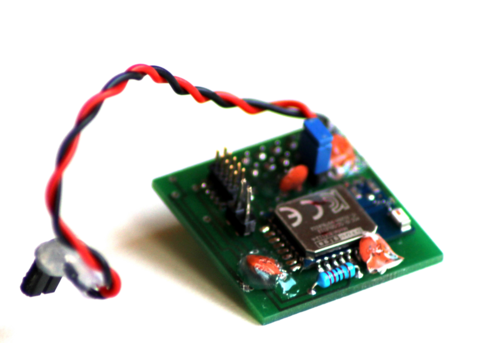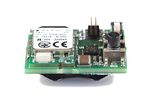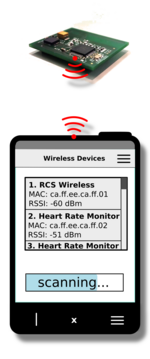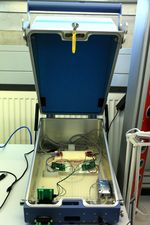Wireless Systems and Networking Research @ RCS
Wireless connectivity is present in the everyday live. Wireless networks enable many emerging mobile applications, such as:
- Wireless Sensor Networks, e.g., for Mobile Healthcare
- Smart Homes
- Internet of Things
- Object Tracking
Reducing Energy Consumptions in Wireless Systems
In such applications, many participating devices of are powered by batteries or energy-harvesting. Therefore, energy-efficient network protocols are a crucial requirement for long battery lifetimes. Using ultra-low-power technologies, coin-cell battery powered wireless devices can achieve lifetimes of months and even years, nowadays.
To realize such applications, the RCS is committed to develop techniques for reducing the energy-consumption of wireless networks. In particular, we are working on the following techniques:
- Energy-Efficient Protocol Design
One of the largest energy consumers of wireless devices are their wireless communication interfaces. At the RCS, we analyze wireless protocols to identify potentials for saving energy, design efficient protocols and derive and implement appropriate power-management-techniques.
Before two devices can exchange data, they have to discover each other for the first time and synchronize their clocks. This asynchronous communication procedure is called neighbor discovery. It is one of the most energy-expensive operations in wireless networks. Therefore, we are working on energy-efficient protocols for neighbor discovery. In this field, we have developed the first theory to analyze periodic interval-based protocols, such as Bluetooth Low Energy (BLE) and ANT/ANT+. In addition, our protocols PI-kM+-Opt and Griassdi can achieve one order of magnitude faster discoveries than the best known previously known solutions, while consuming the same amount of energy.
After two devices have discovered each other, they follow a synchronous communication schedule in many protocols, e.g., BLE. By adjusting this schedule online based on the traffic requirements, we can reduced the energy-consumption by up to 40%. In addition, our technique to exploit the movements of a human body can be used to reduce the transmit power in body-worn networks, which saves additional energy. - Energy-Efficient Wireless Sensor Nodes
At the RCS, we develop custom sensors and analyze existing ones for potential techniques to reduce the energy consumption. Our sensor E1CH has the size of a coin and can sense acceleration or perform localization tasks for multiple weeks without changing the battery. To characterize its energy-consumption in mobile networks, we have designed EG0N, a mobile power monitoring device. - Data Compression in Wireless Networks
If signals are compressed before being sent wirelessly, the energy a mobile device spends on processing is increased, while the energy for transmission can be reduced. However, most existing compression schemes are optimized for high compression rates, while neglecting the required processing effort and memory footprint. For mobile networks, a trade-off between high compression efficiencies (and hence low transmission energies) and low processing effort (and hence low energies for processing) is required. Further, mobile devices mostly have limited memories. At the RCS, we develop compression schemes that minimize the joint energy-consumption for processing and wireless transmission, while realizing small memory footprints. - Next Generation System Architectures
Currently, the firmwares of mobile wireless devices are considered to be monolithic and fixed. This also implies that the functionalities of such devices are predefined. At the RCS, we work on flexible architectures that can replace or install parts of the firmware during runtime. Thus, the functionality can be defined by application concepts, similar to smartphone apps. Towards this, we are working on concepts for installing code wirelessly and executing code in an efficient manner. Further, such architectures open up flexible power-management schemes, in which the code for the power-management can be exchanged on the fly during runtime. By doing so, a distributed power-management systemin a wireless network can adapt to changing network topologies, incidents or states of operation.
Applications for tomorrow
In addition to our research on low power WSNs, we do research on future applications of WSN in domains such as mobile healthcare or safety systems. Non-invasive, low power sensor technology developed at the RCS will contribute to making our lives more convenient and safe in the future.
Towards this, we also contribute to the BMBF-funded project HE2mT.
BLEeMod - Precise Energy Modeling for the Bluetooth Low Energy Protocol

Estimating the energy consumption of the wireless interface is a crucial design requirement for low power devices. The RCS offers tools for energy estimation.
Neighbor Discovery Latency in BLE-Like Duty-Cycled Protocols
Contact
Recent Publications
- Philipp H. Kindt, Samarjit Chakraborty. On Optimal Neighbor Discovery. To appear at the Conference of the ACM Special Interest Group on Data Communication (ACM SIGCOMM) 2019
- Philipp H. Kindt, Samarjit Chakraborty. Power-aware Reliable Communication for the IoT To appear at the IEEE International Symposium on On-Line Testing and Robust System Design (IOLTS) 2019
- Philipp H. Kindt, Sangyoung Park, Samarjit Chakraborty. Fast Collision Simulation for Cyclic Wireless Protocols. CoRR abs/1807.01645 (2018)
- Philipp H. Kindt, Marco Saur, Michael Balszun and Samarjit Chakraborty. Neighbor Discovery Latency in BLE-Like Protocols. IEEE Transactions on Mobile Computing (TMC), vol. 17, no. 3, pp. 617-631, 2018
- Daniel Yunge, Sangyoung Park, Philipp H. Kindt, Samarjit Chakraborty. Dynamic Alternation of Huffman Codebooks for Sensor Data Compression. IEEE Embedded Systems Letters (ESL), vol. 9, no. 3, pp. 81-84, 2017
- Nils Heitmann, Philipp H. Kindt, Thomas Rosner, Kapil Sikka, Amit Chirom, Dinesh Kalyanasundaram, Samarjit Chakraborty. Sound4All: Towards Affordable Large-Scale Hearing Screening. International Conference on Design &Technology of Integrated Systems in Nanoscale Era (DTIS), 2017
- Philipp H. Kindt, Daniel Yunge, Gerhard Reinerth, Samarjit Chakraborty.
Griassdi: Mutually Assisted Slotless Neighbor Discovery. ACM/IEEE International Conference on Information Processing in Sensor Networks (IPSN), 2017 (Acceptance Rate: 18%) - Philipp H. Kindt, Nils Heitmann, Gerhard Reinerth, Samarjit Chakraborty.
Demo: Understanding Slotless Neighbor Discovery. ACM/IEEE International Conference on Information Processing in Sensor Networks (IPSN), 2017 - Daniel Yunge, Sangyoung Park, Philipp H. Kindt, Samarjit Chakraborty- Dynamic Service Synthesis and Switching for Medical IoT and Ambient Assisted Living. IEEE International High-Level Design Validation and Test Workshop (HLDVT), 2016
- Philipp H. Kindt, Daniel Yunge, Andreas Tobola, Georg Fischer, Samarjit Chakraborty.
Dynamic Service Switching for the Medical Internet of Things. Annual IEEE International Symposium on Personal, Indoor and Mobile Radio Communications (PIMRC), 2016 - Philipp H. Kindt, Marco Saur, Samarjit Chakraborty.
Slotless Protocols for Fast and Energy-Efficient Neighbor Discovery. in submission - Nils Heitmann, Philipp H. Kindt, Samarjit Chakraborty.
- EG0N: Portable In-Situ Energy Measurementfor Low-Power Sensor Devices. to appear at IEEE International Symposium on VLSI Design and Test (VDAT), 2016
- Philipp H. Kindt, Samarjit Chakraborty. Neighbor discovery latency in BLE-like duty-cycled protocols. in submission
- Daniel Yunge, Philipp H. Kindt, Michael Balszun, Samarjit Chakraborty. Hybrid Apps: Apps for the Internet of Things. IEEE International Conference on Embedded Software and Systems (ICESS), 2015
- Philipp H. Kindt, Jing Han, Nadja Peters, Samarjit Chakraborty.
ExPerio - Exploiting Periodicity for Opportunistic Energy-Efficient Data Transmission. IEEE International Conference on Computer Communications (INFOCOM), 2015 (Acceptance Rate: 19%) - Philipp H. Kindt, Daniel Yunge, Mathias Gopp, Samarjit Chakraborty.
Adaptive Online Power-Management for Bluetooth Low Energy. IEEE International Conference on Computer Communications (INFOCOM), 2015 (Acceptance Rate: 19%) - Philipp H. Kindt, Daniel Yunge, Robert Dimer, Samarjit Chakraborty. Precise Energy Modeling for the Bluetooth Low Energy Protocol. technical report, 2014







